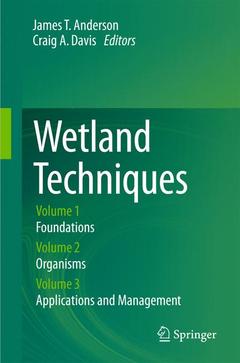Description
Wetland Techniques, 2014
Volumes 1-3
Coordinators: Anderson James T., Davis Craig A.
Language: English
Subjects for Wetland Techniques:
1100 p. · 15.5x23.5 cm · Paperback
Description
/li>Comment
/li>
Provides a first of its kind compilation of scientific wetland research and management techniques
Volume 1 provides a solid foundation on the basics of wetland science including study design, and assessing hydrology, hydric soils, and hydrophytic vegetation
Volume 2 presents the principles for sampling and evaluating wetland biotic communities from algae, bacteria and fungi to invertebrates, fish, and wildlife
Volume 3 details specialized methods for assessing, evaluating, monitoring, developing, interpreting, and managing wetlands




